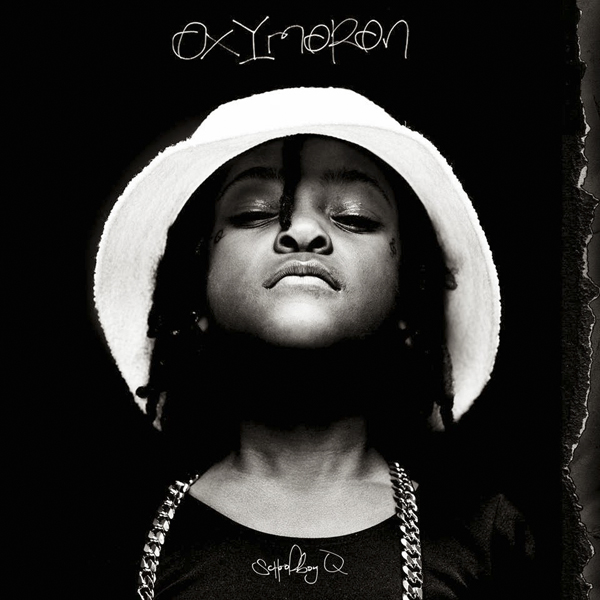
Expected to be dropped in early to mid-2013, Schoolboy Q officially released “Oxymoron” on Feb. 25 to eager ears. Many expectations weighed on this project: a growing career, a high bar set by “Habits and Contradictions” and the competition from fellow labelmate Kendrick Lamar after “Good Kid.” The hype is answered with a loosely conceptual toned-down album as Q deals with his drug-fueled past — and fatherhood.
Q’s daughter, Joy, who graces the album’s cover, utters some of the first lines of the album: “Fuck rap, my daddy a gangsta.” These lines push the “Oxymoron” theme: youthful belligerence, prescription drugs and Q’s achievements because of — and in spite of — those drugs. “Gangsta,” the drive-by anthem that killed Lamar’s character Dave in “Good Kid,” is a straight introduction to it all. Unfortunately, it’s followed by a would-be gangster anthem, “Los Awesome.” The track screams production by Pharrell Williams, but Williams’ production style, blended with the rugged Schoolboy persona, doesn’t work. Q doesn’t get lucky here.
“Oxymoron” is much more commercially accessible than his previous work. The pop appeal is sprinkled throughout the album with songs like “Studio,” which features a Nate Dogg-esque hook by BJ the Chicago Kid. Then there’s “Man of the Year,” the true life of the party. “Weed cards every corner sell herb, what’s a fly to a bird” is Q’s decree for California, and it really is a verse “straight from the morgue” — Q kills it.
Now, although these tracks are more commercially accessible, I’m not implying that they’re less credible or inferior to anything else on the album. If anything, it’s simply a wider appeal in comparison to “Habits,” where sonic cohesiveness is sacrificed in the name of a singular track escapade.
The drug usage, supreme violence and explicit sexuality alone would set this album on par with what could be a typical hip-hop album, but what’s critical to this album’s successes is Q’s reflection on how all this negativity molded him and continues to affect him into fatherhood. Whether that is weed, alcohol or the oxycontin inspiration for the album title, the subject of drugs dominates “Oxymoron” and Q acknowledges it in both a positive and negative light.
“Hoover Street” tells of the story of a younger Q dealing with his drug-addled uncle, as his mother locks away their belongings so he won’t steal them for drugs. It’s a product-of-your-environment type track, where Q drops the line, “This little piggy went to market, this little piggy carry chrome.” A stronger point of reference is Joy’s features on the album. She poses a chilling backdrop in contrast to what Q is rapping about, which comes to a climax on “Prescription/Oxymoron.” Q dips in and out of consciousness on prescription drugs as soft electric keys come in and out in the background, accompanied by disconsolate strings while Joy attempts to wake her father from his drug coma. It’s distressing to hear as she begs, “What’s wrong, you tired, you mad? Okay, I love you daddy.” This is followed by a changed beat on the same track as Q ends his drug dealing, but not the usage.
“Oxymoron” is a strong major label debut by Q, creating a pleasantly cohesive album. At points it’s marred by the lack of topical range, even though it’s an endless discussion for Q that ties in with his personal truth. It can serve a party or hangout atmosphere, but it has enough introspection to deserve a straight listen in a quieter setting. It’s what Schoolboy wanted to present, and what’ll satisfy his excited fans.
Rating: 4 stars








